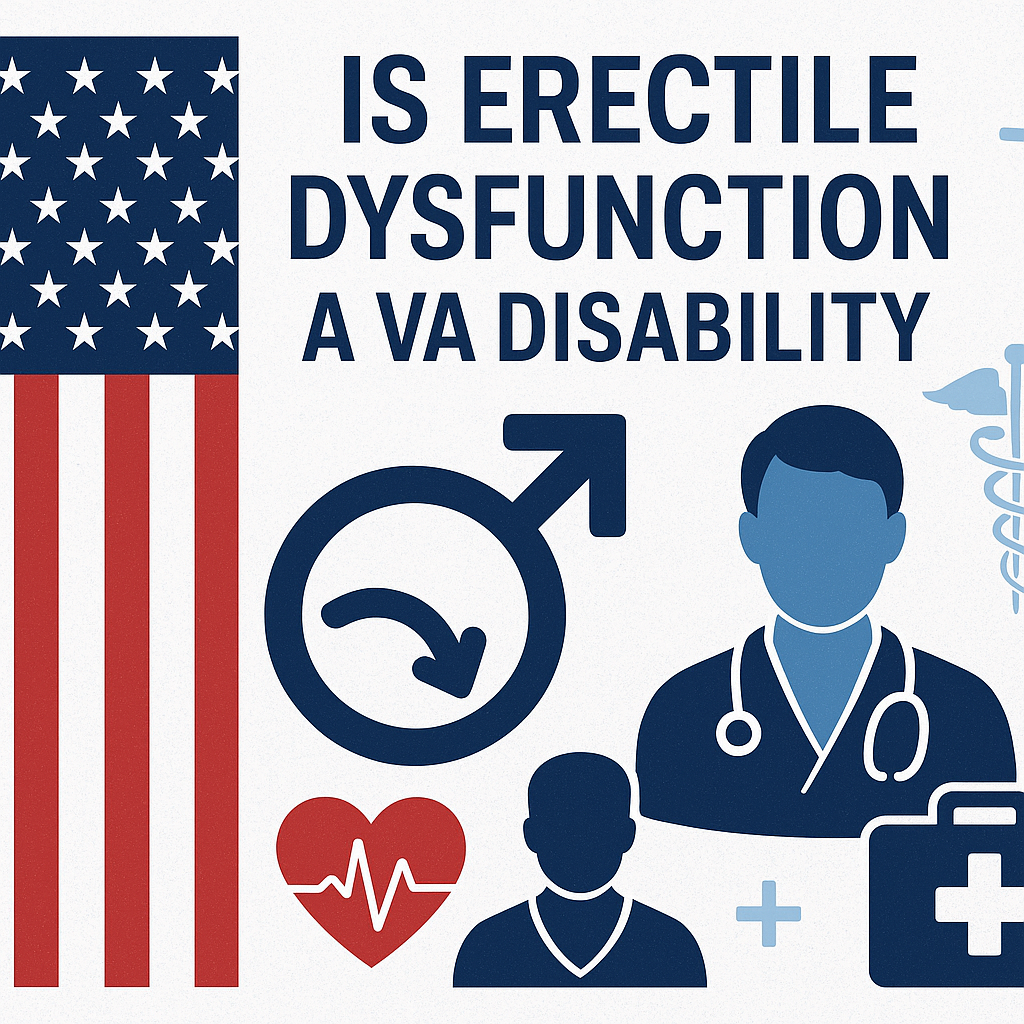Disclaimer
This article is for informational purposes only and should not be considered medical or legal advice. Veterans should consult qualified healthcare providers and VA-accredited representatives for assistance with diagnosis, documentation, and claim filing.
Erectile dysfunction (ED) affects many veterans due to physical, psychological, and service-related health conditions. It can result from injuries, stress disorders, or medications prescribed for service-connected disabilities. What many veterans don’t realize is that erectile dysfunction can qualify as a VA disability under certain circumstances. The U.S. Department of Veterans Affairs (VA) recognizes ED as a compensable condition when it is linked directly to or caused by military service or other service-related conditions. Understanding how this works is crucial for veterans seeking benefits and support for a condition that can impact their confidence, relationships, and quality of life. This guide explains how the VA defines erectile dysfunction, when it qualifies as a disability, and how veterans can file for compensation or receive special monthly benefits.
What Is Erectile Dysfunction
Erectile dysfunction is the persistent inability to achieve or maintain an erection firm enough for sexual activity. While occasional performance issues are common, chronic ED often has deeper physical or psychological causes. For veterans, these may include trauma, medication side effects, or mental health conditions such as post-traumatic stress disorder (PTSD). In some cases, nerve or vascular damage sustained during service directly interferes with the ability to maintain an erection. Because ED can be both a symptom and a consequence of other health conditions, it is often evaluated alongside broader service-connected disabilities.
When Erectile Dysfunction Qualifies as a VA Disability
The VA considers erectile dysfunction a disability when there is clear evidence that it is caused or aggravated by military service or by another service-connected disability. This means ED doesn’t need to be a standalone diagnosis. It can qualify if it is secondary to another condition already recognized by the VA. For instance, veterans who suffer from PTSD, diabetes, hypertension, or spinal cord injuries may experience ED as a secondary symptom. In such cases, the VA can grant disability benefits for erectile dysfunction as part of an existing service-connected claim. To qualify, veterans must demonstrate a direct medical link between their service, the primary disability, and the resulting ED.
Common Service-Connected Causes of ED
There are several common pathways through which service-related conditions contribute to erectile dysfunction.
1. PTSD and Depression
Post-traumatic stress disorder and depression are prevalent among veterans and are strongly associated with ED. Both conditions disrupt hormone levels and reduce libido. Medications prescribed for these mental health disorders, such as SSRIs and other antidepressants, can also cause erectile problems.
2. Diabetes and Hypertension
Many veterans develop diabetes or high blood pressure due to lifestyle changes, stress, or long-term service-related health effects. Both conditions impair blood flow and damage nerves, increasing the likelihood of ED.
3. Spinal Cord and Pelvic Injuries
Combat or service injuries involving the spine, pelvis, or lower extremities may damage the nerves and blood vessels responsible for erections. Such injuries are clear examples of direct service-related causes.
4. Medication Side Effects
Veterans taking medications for chronic pain, high blood pressure, or psychological conditions may experience ED as a side effect. If these medications are prescribed for service-connected conditions, ED becomes a secondary condition eligible for benefits.
5. Hormonal and Endocrine Issues
Prolonged stress or injuries affecting the hypothalamus and pituitary gland can disrupt testosterone levels. Low testosterone, in turn, contributes to erectile dysfunction.
VA Disability Ratings for Erectile Dysfunction
Unlike many other conditions, erectile dysfunction is not assigned a traditional schedular disability rating under the VA’s rating system. Instead, it is evaluated under 38 C.F.R. § 4.115b, Diagnostic Code 7522. According to this code, veterans can receive a 0% disability rating for erectile dysfunction. However, even though the rating is technically 0%, the condition still qualifies for Special Monthly Compensation (SMC) under category (k) for loss of use of a creative organ.
This means veterans may not receive monthly compensation based on a percentage rating for ED, but they are eligible for additional tax-free benefits due to loss of sexual function. The monthly SMC payment serves as recognition that the disability affects quality of life, intimacy, and reproductive ability.
Special Monthly Compensation (SMC-K)
SMC-K is a separate form of compensation for veterans who suffer loss or loss of use of certain body parts or functions due to service-connected disabilities. In the case of ED, “loss of use of a creative organ” refers to the inability to engage in normal sexual activity due to impotence or physical dysfunction.
As of 2025, the SMC-K rate is approximately $128.62 per month (though this figure may change annually with cost-of-living adjustments). Veterans can receive SMC-K in addition to their existing disability payments for other service-connected conditions. Importantly, receiving SMC-K for ED does not reduce or interfere with other compensation benefits.
Even if a veteran’s ED is rated at 0%, the SMC-K award provides financial recognition of the impairment’s impact on daily life.
How to File a VA Claim for Erectile Dysfunction
Filing a VA claim for ED requires three essential components:
1. Current Diagnosis
You must have a medical diagnosis of erectile dysfunction from a qualified healthcare provider. Self-reported symptoms are not enough; the VA requires documented medical evidence.
2. Service Connection
You must show that your ED is linked to your service or another service-connected condition. This connection can be established in three ways:
- Direct service connection: ED was caused by an event, injury, or illness during active duty.
- Secondary service connection: ED developed as a result of another service-connected disability (for example, diabetes, PTSD, or medication side effects).
- Aggravation: A pre-existing condition was worsened by military service or its treatments.
3. Medical Nexus
A medical nexus letter from a physician or specialist can strengthen your claim by clearly linking your ED to a service-related cause. The letter should explain the biological or psychological connection in plain terms for the VA to review.
Evidence Required for a Successful Claim
The VA evaluates claims based on supporting medical documentation. Evidence can include:
- Urology or endocrinology reports diagnosing ED
- Records of medications that list ED as a side effect
- Service treatment records showing related injuries or conditions
- Psychological evaluations for PTSD, anxiety, or depression
- A nexus letter connecting ED to the primary service-connected disability
Lay statements from the veteran or spouse can also be helpful. Personal testimony describing the condition’s onset, progression, and impact on intimacy can provide context to the medical evidence.
VA Medical Exams (C&P Exams)
When you file a claim for erectile dysfunction, the VA will likely schedule a Compensation and Pension (C&P) exam. During this evaluation, a medical examiner reviews your history, performs a physical exam if necessary, and assesses how ED affects your life. The examiner will also determine whether the ED is linked to a service-connected condition or medication. It’s important to be honest and detailed during the exam, as the report heavily influences the VA’s decision.
Erectile Dysfunction as a Secondary Disability
One of the most common ways veterans qualify for ED benefits is through secondary service connection. This means the condition developed as a result of another service-connected issue rather than direct injury. For example, a veteran receiving disability for PTSD or diabetes may later experience ED due to those conditions or the medications prescribed for them. In this scenario, the veteran can submit a secondary claim supported by medical evidence showing causation. Secondary claims often succeed when the primary condition is already well established in VA records.
Erectile Dysfunction and PTSD
PTSD is one of the strongest psychological links to erectile dysfunction among veterans. The hyperarousal, anxiety, and intrusive thoughts associated with PTSD interfere with normal sexual response. Antidepressant and antipsychotic medications used to manage PTSD can further suppress libido or cause performance issues. The VA frequently recognizes ED as secondary to PTSD, especially when documented by both a psychologist and a primary care provider. Veterans filing such claims should include mental health evaluations and medication lists to strengthen their case.
Erectile Dysfunction and Diabetes or Cardiovascular Disease
Diabetes and heart disease are prevalent among veterans and are leading causes of erectile dysfunction. Poor blood sugar control damages small blood vessels and nerves, reducing blood flow to erectile tissue. Similarly, atherosclerosis from high cholesterol or hypertension limits circulation. When these conditions are service-connected, the VA often acknowledges ED as a secondary complication. Submitting laboratory results, medication records, and doctor statements linking vascular or nerve damage to ED can help secure approval.
Erectile Dysfunction Due to Medication Side Effects
Many veterans take long-term medications for service-connected conditions, such as antidepressants, antihypertensives, or opioids for pain management. These drugs can interfere with hormone balance and blood flow, leading to erectile problems. Veterans can file a claim stating ED as a secondary disability caused by prescribed medications. To support the claim, provide prescription records and medical notes confirming the timing and side effects.
How the VA Determines Compensation
Even though erectile dysfunction itself receives a 0% schedular rating, the VA still recognizes it as a legitimate disability when connected to service. The most common outcome is the SMC-K benefit, though additional compensation can be awarded if ED is part of a more complex disability picture involving psychological trauma or severe injuries. The VA uses all medical and personal evidence to assess how the condition affects daily life, relationships, and mental well-being.
Appealing a Denied Claim
If your claim for ED is denied, you have the right to appeal. Common reasons for denial include lack of a clear service connection, missing medical evidence, or insufficient documentation. The best strategy for appeal is to obtain a detailed nexus letter from a medical professional explaining how your service or existing disability directly caused or worsened ED. Veterans’ service organizations (VSOs) and accredited representatives can assist with appeals and ensure all necessary evidence is included.
Final Thoughts
Erectile dysfunction is a common yet often overlooked condition that affects thousands of veterans. The good news is that the VA recognizes it as a compensable disability when it’s related to service-connected conditions. While ED typically receives a 0% disability rating, veterans can still receive Special Monthly Compensation (SMC-K) for the loss of use of a creative organ, along with potential secondary benefits tied to PTSD, diabetes, or other medical conditions. Veterans experiencing ED should not hesitate to discuss it with their healthcare provider and file a claim if appropriate. Seeking compensation is not only about financial support—it’s also about acknowledging the full scope of service-related health challenges.

